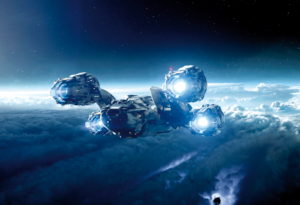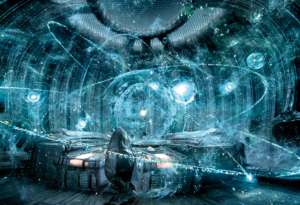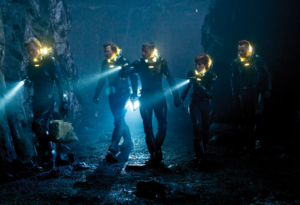Ever since the first Alien film hit our screens back in the late 1970s viewers have only wondered at the origins of the insectile xenomorphs. Where did they come from? How did they end up on the deserted ship? And what was the strange skeletal remains that were discovered onboard? Now, just over thirty years later we finally find out in Prometheus, Ridley Scott’s prequel to his Alien franchise.
A film that is curiously absent of the chest-bursting aliens that we have come to associate with the series, the film centres on the crew of the Prometheus spaceship who have been led to an uncharted planet by a series of cave paintings that have been discovered across the globe. They all point to a distant constellation which the explorers believe holds the key to the creation of mankind. However, when they arrive at the far off planet, they encounter a terrifying secret, and the future of humanity itself is at danger unless they stop it.
For director Ridley Scott, Prometheus represents a return to the science fiction genre for three decades (the other Alien sequels all being helmed by a different director). The motive behind this self-imposed hiatus was down to looking for the right project to work on … As with the first Alien film, he wanted to make a truly groundbreaking movie, biding his time as he waited for the right script to come along. “The reason I haven’t made another sci-fi film in so many years,” the director explains. “Apart from the fact I’ve been busy making other films and exploring different genres, is because frankly I haven’t come across anything worthwhile for me to do with enough truth, originality and strength. Prometheus has all three. Prometheus is the singular genre tale I’d been searching for.”
Resisting the temptation to make a straight-forward Alien prequel, which many fans would have expected, along with co-screenwriter Jon Spaihts, Scott instead devised a whole new mythology that would take the film into an unexpected direction with strong elements of horror throughout. “Our story circles the truth of what might be out there and therein lays its most frightening aspect. Feasibility always creates the finest and most dangerous drama and the opportunity for me to scare the hell out of everyone .” Combining elements of horror, science fiction, evolution and religion, Prometheus attempts to answer all of the questions asked about the movies whilst taking the films into a leftfield direction.
Perhaps the biggest question on everyone’s lips centered on the creature dubbed ‘Space Jockey’ – the giant, long-dead alien who was found aboard the first ship. “Something that had stayed with me ever since Alien, was the mystery behind it,” the director muses. “Who was he? Where was he from? What was his mission? What kind of technology would his kind possess? I thought those questions could provide a springboard for even larger ideas.” By attempting to answer the questions behind his mysterious appearance, the central plotlines behind Prometheus slowly started to evolve …
“Out of the creative process in developing the picture emerged a new, grand mythology, in which this original story takes place,” Scott reveals to us. “The keen fan will recognise strands of Alien’s DNA, so to speak, but the ideas tackled in this film are unique, far-reaching and provocative.”
Prometheus, the film’s title, was inspired by the ancient Greek mythological figure and is also the name of the spaceship that the explorers pilot to the new world in order to discover the secret behind the bizarre cave drawings. “When you talk about the myth on which the title is based, you’re dealing with humankind’s relationship with the gods – the beings who created us – and what happens when we defy them. The film’s central metaphor is about the Greek Titan Prometheus, who defies the gods by giving humans the gift of fire, for which he is horribly punished.”
When the crew arrive on the alien planet, hoping to find the answer to mankind’s creation, they only discover death and destruction. It is obvious that a deadly life-form destroyed the remnants of the civilisation there, and as they explore further they find out the frightening truth – not everything is dead.
Armed with a ground-breaking script, Ridley Scott set about hiring some of Hollywood’s finest acting talent to bring his production to life. Noomi Rapace takes up the mantel of the strong female role that Sigourney Weaver was so famous for in the Alien movies, playing the part of Elizabeth Shaw – a scientist who is torn between the truth behind humanity’s origins and her own religious beliefs. The Swedish actress came to the directors attention through her performance in the original The Girl With the Dragon Tattoo, and more recently made her Hollywood debut in Guy Ritchie’s Sherlock Holmes: A Game of Shadows in which she plays a fiery Romanian gypsy. “Noomi combines a rare intelligence and physicality,” says the filmmaker. “She owned that part in The Girl with the Dragon Tattoo,” states the filmmaker. “It was so powerful that when Noomi and I met, I expected a tough, hardened individual; instead, Noomi was lovely, kind and smart. It was a terrific mix that would serve her well playing Elizabeth Shaw.”
Michael Fassbender appears as the android who is charged with looking after the ship’s crew on their long journey to the alien planet. “He’s basically the ship’s housekeeper,” notes Scott. “He keeps an eye on every-thing while the human crew is in suspended animation.” The actor who plays Magneto in X-Men: First Class pulls off another scene stealing performance here. British actor Idris Elba (who has appeared in Marvel’s Thor and The Wire television series) and Charlize Theron (Monster, The Devil’s Advocate) complete the main line-up, and are supported by a host of other big names including Guy Pearce (L.A. Confi dential, Memento) and Logan Marshall-Green (M Night Shyamalan’s Devil, Dark Blue television series).
Of course, the real stars of the show are the alien life-forms themselves, and for fans who are expecting the same species of alien that have featured in the other films may be left feeling slightly disappointed. Instead of the Xeomorph that we have all come to expect, instead we witness how the race began from its very inception. “We present the evolution of these nasty bits and pieces of creature in a logical and biological fashion,”
Scott explains, making Prometheus a true prequel to the franchises other films. And if you thought the chest-burster scene was shocking, you really have not seen anything yet.
Shot entirely at Pinewood Studios in 3D and filmed under a budget that dwarfs that of the previous films in the franchise, Scott promises that Prometheus will be an experience unlike any other. Prepared to be terrified and dazzled in equal measure. And remember – in space no-one can hear you scream. Sorry, we just couldn’t resist ourselves there!
PROMETHEUS / PROMETHEUS – DUNKLE ZEICHEN Science Fiction, USA 2012 –
Directed by Ridley Scott
Written by Jon Spaihts, Damon Lindelof
Music by Marc Streitenfeld
Cinematography: Dariusz Wolski
Starring: Noomi Rapace, Michael Fassbender, Guy Pearce, Idris Elba, Logan Marshall-Green, Charlize Theron
Distributed by 20th Century Fox
Release: August 9, 2012






